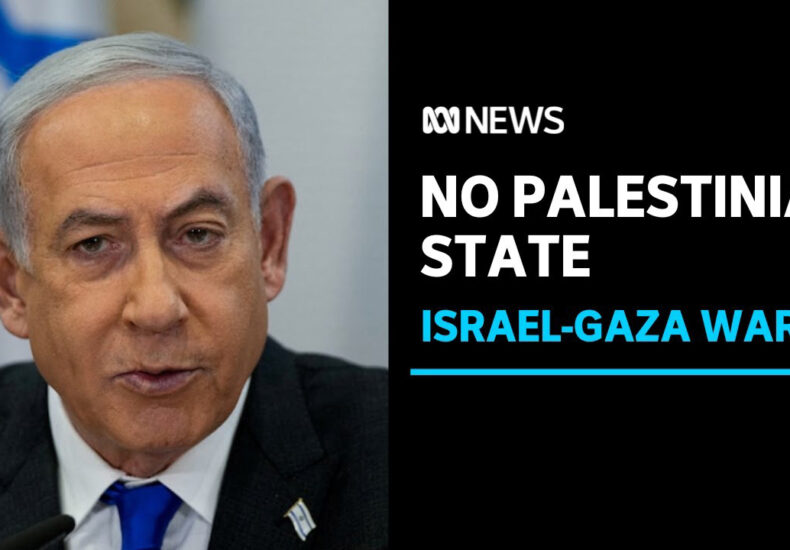
Netanyahu Affirms: No Palestinian State Will Ever Exist
Fundacion Rapala – Israeli Prime Minister Benjamin Netanyahu has firmly declared that a Palestinian state will never be formed under his leadership. He made this bold statement during a settlement expansion ceremony held on Thursday (Sept 11) in Maale Adumim, an Israeli settlement east of Jerusalem.
“This Land Is Ours” – A Defiant Statement from Netanyahu
During his speech, Netanyahu stated, “We will fulfill our promise that there will be no Palestinian state. This land belongs to us.” He emphasized Israel’s intention to protect its heritage, land, and security. Moreover, he vowed to double the population of Maale Adumim in the coming years.
The E1 Corridor Remains a Key Flashpoint
The ceremony coincided with plans to expand into the E1 corridor, a highly sensitive area connecting Jerusalem to Maale Adumim. The zone spans about 12 square kilometers and has long been a source of international concern. If developed, it would disrupt Palestinian territorial continuity between the northern and southern West Bank.
Read This : Ghost of Yotei Director Grateful for GTA VI Delay, Calls It a “Wonderful Day”
Smotrich’s Approval Amplifies Settlement Plans
In August, Finance Minister Bezalel Smotrich approved the construction of 3,400 housing units in the E1 zone. This move immediately sparked backlash. Critics argue that such developments destroy the possibility of a future Palestinian state by physically fragmenting the West Bank.
UN Secretary-General Issues a Stern Warning
Reacting to Israel’s settlement plans, UN Secretary-General Antonio Guterres issued a strong statement. He warned that building in E1 poses an “existential threat” to the two-state solution. According to Guterres, the expansion could divide the West Bank in half, making the formation of a Palestinian state nearly impossible.
Settlements Still Deemed Illegal Under International Law
Despite having domestic planning approval, all Israeli settlements in the West Bank are still considered illegal under international law. These territories have been under Israeli occupation since the 1967 Six-Day War. Most global institutions, including the United Nations, maintain this legal position.
Palestinian Lands Face Further Fragmentation
Many Palestinians and international observers fear that settlement expansion is making peace even harder to achieve. Building in E1 would not only isolate Palestinian communities but also weaken their social, political, and economic networks. Consequently, it would make self-governance and mobility more difficult.
UK and France Consider Recognizing Palestinian State
In response to recent developments, the United Kingdom and France are reportedly planning to recognize Palestine as a sovereign state at the United Nations. This diplomatic move may occur by the end of the month. However, both nations have made it clear that recognition depends on whether Israel agrees to a ceasefire in Gaza.
Far-Right Israeli Politicians Push for Annexation
In recent months, right-wing Israeli ministers have called for the full annexation of parts of the West Bank. These calls have grown louder and more frequent. While once considered extreme, such proposals are gaining support within parts of the Israeli government.
Peace Now Sounds Alarm on Imminent Construction
The Israeli NGO Peace Now, which monitors settlement activity, has also issued warnings. The group reports that infrastructure work in E1 could begin within months. Moreover, housing construction may follow within a year if the plan proceeds unchecked.
Demographic Realities Complicate the Situation
Currently, the West Bank is home to 3 million Palestinians and about 500,000 Israeli settlers. This demographic imbalance adds pressure to the political landscape. As settlements increase, the chances of peaceful coexistence continue to shrink.
Regional Instability Continues to Escalate
Tensions remain high across the region. Netanyahu’s rejection of Palestinian statehood comes as military conflict continues in Gaza, triggered by the Hamas attack in October 2023. The combination of conflict and settlement expansion further strains diplomatic efforts.
Netanyahu’s Message Signals a Policy Shift
While Netanyahu has always been cautious about the two-state solution, this latest declaration marks a more aggressive shift. He has moved from skepticism to outright denial. This change reflects a new direction in Israeli policy under his leadership.
Chances for Future Peace Talks Grow Slimmer
As both sides grow more entrenched in their positions, prospects for meaningful peace talks fade. With the E1 expansion underway and Netanyahu’s hardline stance, hopes for a negotiated solution seem increasingly remote.
Conclusion: One Statement, Global Implications
Netanyahu’s vow that there will be “no Palestinian state” is not just a domestic policy. It has global consequences. The declaration reshapes the diplomatic landscape, challenges international law, and threatens to close the door on peace. Whether the world responds with diplomacy or pressure remains to be seen.